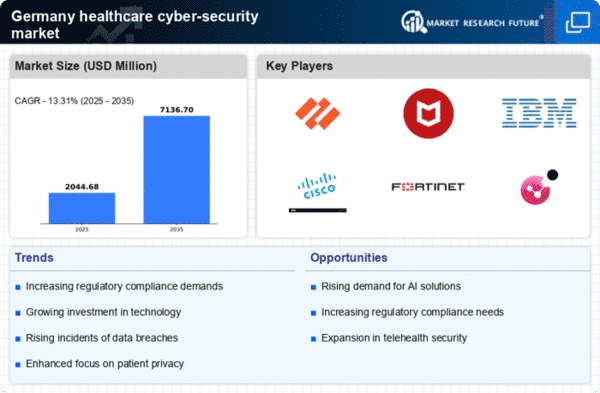Integration of IoT Devices
The proliferation of Internet of Things (IoT) devices within healthcare settings is driving the healthcare cyber-security market. As hospitals and clinics increasingly utilize connected devices for patient monitoring and data collection, the potential for cyber vulnerabilities rises. In Germany, it is estimated that over 70% of healthcare organizations have integrated IoT technologies, which, while enhancing patient care, also expose them to cyber threats. Consequently, the demand for specialized cyber-security solutions tailored to protect these devices is likely to increase. This trend indicates a growing recognition of the need for comprehensive security frameworks that address the unique challenges posed by IoT in healthcare.
Rising Cyber Threat Landscape
The healthcare cyber-security market is experiencing heightened demand due to the escalating cyber threat landscape in Germany. With an increase in sophisticated cyber-attacks targeting healthcare institutions, the need for robust security measures has become paramount. Reports indicate that healthcare organizations in Germany have faced a surge in ransomware attacks, leading to significant operational disruptions. As a result, investments in cyber-security solutions are projected to grow, with the market expected to reach approximately €1.5 billion by 2026. This alarming trend underscores the necessity for healthcare providers to adopt comprehensive cyber-security strategies to safeguard sensitive patient data and maintain trust.
Shift Towards Cloud-Based Solutions
There is a notable shift towards cloud-based solutions in the healthcare cyber-security market. As healthcare organizations in Germany increasingly adopt cloud technologies for data storage and management, the need for secure cloud environments becomes essential. This transition is driven by the desire for scalability, cost-effectiveness, and improved accessibility of healthcare data. However, it also raises concerns regarding data security and privacy. Consequently, the demand for cloud-based cyber-security solutions is expected to rise, as organizations seek to protect sensitive information stored in the cloud. This trend indicates a significant evolution in the healthcare cyber-security market, as providers adapt to the changing technological landscape.
Growing Demand for Compliance Solutions
Growing demand for compliance solutions is propelling the healthcare cyber-security market. In Germany, healthcare organizations are increasingly required to adhere to stringent data protection regulations, such as the General Data Protection Regulation (GDPR). This regulatory environment necessitates the implementation of robust cyber-security measures to ensure compliance and avoid hefty fines. As a result, the market for compliance-focused cyber-security solutions is projected to grow, with organizations seeking to mitigate risks associated with non-compliance. This trend highlights the critical role of regulatory frameworks in shaping the landscape of the healthcare cyber-security market.
Increased Investment in Cybersecurity Infrastructure
There is a surge in investment in the healthcare cyber-security market aimed at enhancing cybersecurity infrastructure. German healthcare providers are allocating substantial budgets to fortify their defenses against cyber threats. Recent data suggests that spending on cyber-security solutions in the healthcare sector has increased by approximately 25% over the past year. This trend reflects a proactive approach to risk management, as organizations recognize the potential financial and reputational damage associated with data breaches. As a result, the healthcare cyber-security market is expected to expand significantly, driven by the urgent need for advanced security technologies and services.
















